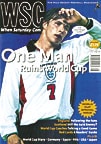 More changes to the laws, who wants 'em? Phil Cornwall does, if it means discouraging players from persistently taking a dive
More changes to the laws, who wants 'em? Phil Cornwall does, if it means discouraging players from persistently taking a dive
In this World Cup, we have seen enough diving to last a lifetime. But I think there’s a need to distinguish between the different motives for it – and indeed accept some of it. Often it has simply been to draw the referee’s attention to offences – notably shirt-pulling, which has been rife and is hard to spot. Are strikers supposed to meekly accept being grabbed, now that defenders won’t risk them getting away for fear of having to tackle with their legs and risking a yellow or red card?
Some of the diving, of course, has been to fabricate offences, to explain away missed chances or poor control. This must be condemned, but can only really be dealt with by more accurate refereeing. A third category, though, has been the result of a conundrum brought about by changes in the laws of the game that players are finally getting the hang of. And another change may now be needed.
Five years ago in these pages, I pointed out that as fouls had to be intentional, clumsy defenders were (by the letter of the law) almost at an advantage; although football had coped with this situation for 100 years, it was an absurdity and now it has gone. But this change has had an unexpected side effect, as attackers adjust to what has happened.
Today, if a defender makes an attempt to play the ball but misses, and the attacker falls over him, it’s a free kick, or a penalty. Which means that an attacker is better off not taking evasive action. If someone leaves themselves open to be fallen over, then the best thing for your team can be to take that tumble.
In certain situations, some players will not be quick enough to get out of the way – does that mean if you are, you should miss out on a penalty because of your agility? No one in this World Cup seems to have thought so – certainly not Michael Owen. Perhaps he could argue that he was running so quickly against Argentina that the change of direction he was forced to make caused him to fall. But had a penalty not been the reward for going down, would he have managed to stay on his feet?
He did at least have the sense to keep running until he reached the defence. Ariel Ortega was seen to dive before he reached Jaap Stam’s leg in Argentina’s next game, costing him a penalty which was there for the taking. The Dutchman had missed the ball; if Ortega went over the leg, or came down trying to avoid it, then he should have had a spot kick. By doing neither, he threw away a place in the World Cup semi-final. Unbelievably stupid though he was, to some extent the situation was created by the fact that he knew that he was always better off tumbling over the opponent rather than going for the ball.
Is there a way round this? There is, of course, one obvious anomaly in the rules surrounding foul play – obstruction. If you get your leg in the way of someone, it’s a direct free kick. If you can move your whole body across, it’s indirect. Surely if you make no attempt to play the ball, that should be a direct free kick offence, since those who do try, but fail, can be so punished?
Yet the indirect free kick could be the closest thing to an answer to the diving problem. If someone makes a legitimate attempt to play the ball, fails, and the attacker is brought down, then a free kick should be indirect – and of course carry no yellow card. Referees are still judges of intent in hand ball cases, and were until a couple of years ago on all free kicks. This would mean that against Argentina Owen would have had an incentive, rather than a disincentive, to carry on and try to reach the ball, if going down brought just an indirect kick rather than a penalty. Defenders who made minor misjudgments would not be treated in the same way as those who deliberately fouled opponents.
It might not be tried. If it is, then there will be obvious problems as referees seek to assess people’s motives; different referees would award a penalty or an indirect free kick in identical cirumstances. But at the moment we have a situation where referees award a penalty or nothing in the same circumstances.
And if we carry on as we are then, as FIFA move ever closer to Sepp Blatter’s dream of a non-contact sport, we will see more and more diving. The terrible truth is, as less physical contact is permitted, the greater the incentive becomes to invent some.
From WSC 138 August 1998. What was happening this month